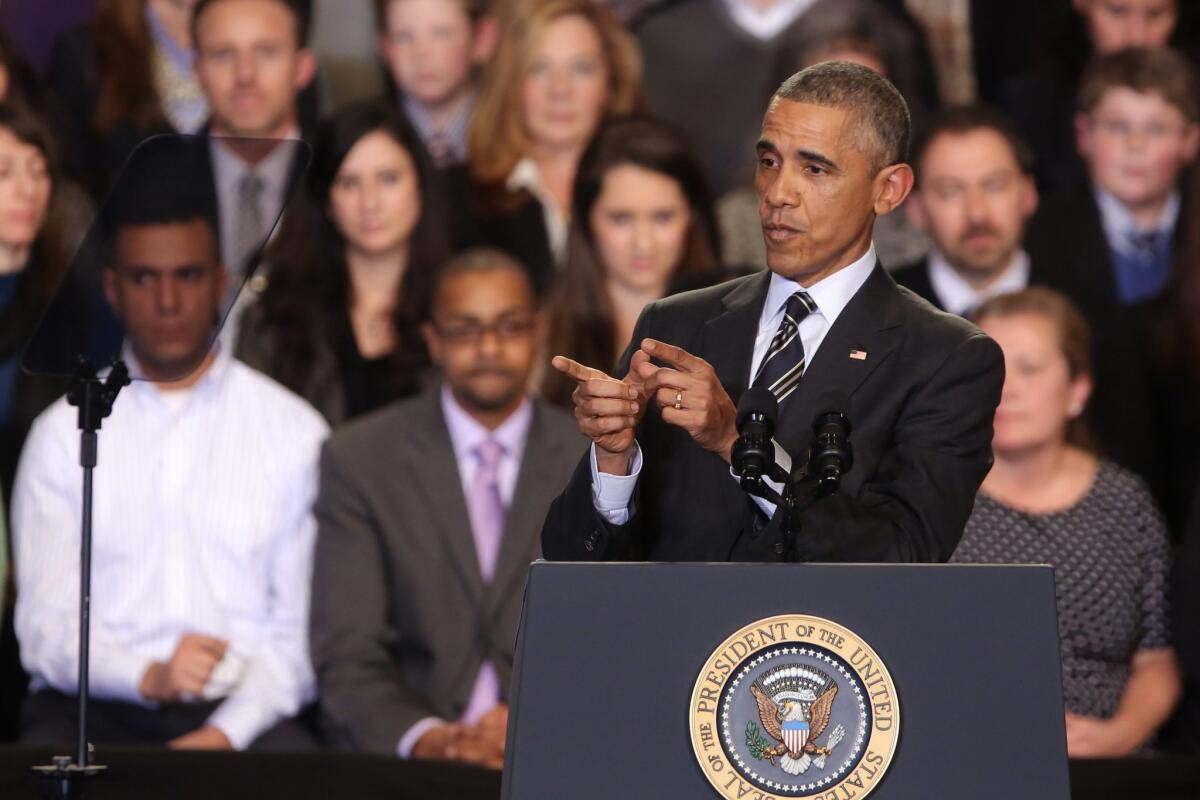Column: GOP ponders its next move in wake of Obama’s immigration action

When President Obama announced his decision to allow roughly 4 million undocumented immigrants to stay in the U.S. without fear of deportation, Democrats and Republicans in Washington disagreed furiously about the move. No surprise there.
Still, I confess to being a little amazed at how, in the days since, not only politicians but eminent legal scholars have lined up to cheer their own sides’ positions.
To Democratic law professors, Obama’s action is a routine exercise of prosecutorial discretion. “The president is not acting unilaterally, but pursuant to his statutory authority,” wrote Duke University’s Walter Dellinger, a former Clinton administration official, in Slate. “Even though the action is breathtaking in scope, there is nothing legally remarkable about [it].”
But to conservative jurists, the president just pulled off a dangerous, unconstitutional power grab. “Obama is flouting his fundamental duty, set out in Article II of the Constitution, to take care that the laws be faithfully executed,” wrote UC Berkeley’s John C. Yoo in National Review. The constitutional remedy, he wrote, would be “impeachment” — but that, alas, would be “self-destructive” for the GOP.
Yes, that’s the same John Yoo who wrote the Justice Department’s secret legal opinions granting then-President George W. Bush unilateral authority to torture detainees and order warrantless wiretapping.
But at least Yoo didn’t go as far as Sen. Ted Cruz (R-Texas), who likened Obama to the power-hungry Roman conspirator Catiline. In 63 BC, Catiline attempted a coup to overthrow the Roman Republic; he was killed in battle by his republican — with a small “r” — foes.
To be fair, a few legal scholars bolted from their partisan roots. Harvard’s Jack Goldsmith, another former Bush administration official, noted acerbically that six years in the White House had turned Democrats “from executive power critics to executive power apologists” — and worked the same transformation on Republicans in reverse.
Still, he wrote on the Lawfare blog, “The administration has made a plausible case for legality.” The more important issue, he added, is whether Obama’s aggressive action stretched the norms of American politics in a way that Democrats will regret — especially if it gives the next Republican president a license to defer enforcement of regulations he doesn’t like.
In most cases, though, the lawyers stuck with their teams, which shouldn’t come as a surprise given the depth of the current divide between the parties on just about every topic.
Is the economy getting better? Most Democrats say it is; most Republicans, insist that it isn’t.
That’s not exclusively a Republican disease. At the end of the Reagan administration in 1988, most Democrats insisted that inflation had not declined — even though it had, dramatically, since Reagan took office.
Is the climate getting warmer? Most Democrats say it is, but only half of Republicans do (and only about one-quarter think it’s mostly due to human activity). And according to a study released this week, Democrats and Republicans even have different memories of weather they have experienced themselves.
After the winter of 2012, “Democrats [were] more likely than Republicans to perceive local winter temperatures as warmer than usual,” reported the paper in the journal Nature Climate Change.
In the case of immigration, there’s a practical reason the dispute has been cast the way it has. Republicans are on much safer ground arguing that Obama’s action was unconstitutional than they would be attacking the details of his policy directive.
Debating whether the 4 million people affected by the executive action, mostly relatives of people who are here legally, should all be deported is not something Republican leaders are eager to do. Such a discussion would divide their party and risk alienating more Latino voters.
But it won’t be easy, now, to avoid having the fight. “We will not stand idle as the president undermines the rule of law in our country and places lives at risk,” House Speaker John A. Boehner (R-Ohio) promised last week.
Boehner has ruled out impeachment, and to the disappointment of his own hard-liners he doesn’t want to shut down the government over the issue. But there’s a long list of other remedies Congress could attempt. It could increase funding for deportation and insist that Obama spend it. It could block funds for programs it doesn’t like, in immigration or any other area. Heck, it could even pass an immigration law.
And, if none of that works, Republicans could try another strategy: They could sue. GOP-led state governments could argue that it will cost them to provide services to those newly legalized immigrants, and ask the federal courts to stop Obama from carrying out his order.
Already, Texas Gov. Rick Perry, Indiana Gov. Mike Pence and Wisconsin Gov. Scott Walker — all of whom, not coincidentally, may run for the Republican presidential nomination — are looking for ways to do just that.
John Yoo, for one, thinks it might just work. After all, it’s the American way.
Twitter: @DoyleMcManus
More to Read
A cure for the common opinion
Get thought-provoking perspectives with our weekly newsletter.
You may occasionally receive promotional content from the Los Angeles Times.







